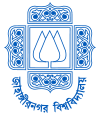
Mirza Taslima Sultana Ph.D. Professor, Department of Anthropology
PROFILE
SHORT BIOGRAPHY
Professor Mirza Taslima Sultana finished the Fulbright Visiting Scholar program on Trolling in Gender and Women's Studies at UC Berkeley, USA, in 2024. She authored a book titled “IVF and Childlessness in Bangladesh: Constructions of Motherhood,” which was published by Taylor & Francis, in 2025. She is co-editing a volume, “A Bangladesh Reader: State, Nation, and Beyond”, which is also in the pipeline with Taylor & Francis. Her book “Women’s Body Subjected under Medical Science: Experiences from Different Classes,” originally written in Bangla, was published by University Press Limited, Dhaka, in 2007.
She has been publishing journal articles, books, and book chapters nationally and internationally. Besides academic write-ups, she also publishes in dailies and periodicals, and takes part in public discussions in the electronic media on contemporary issues. She is part of a collective named ‘Public Nribigyan [Public Anthropology]’ in Bangladesh that publishes a series aimed at the Bengali public outside academia and initiates debate using social media.
Professor Sultana did her Ph.D. at the Center for Gender and Women's Studies at Lancaster University, UK. She did a second Master's in Comparative Studies, Women’s Studies in Culture and Politics at Utrecht University, The Netherlands. Beforehand, her undergraduate and master's degrees in Anthropology were achieved from the Department of Anthropology at Jahangirnagar University in Bangladesh.
In addition to achieving the Fulbright, she was awarded, Institute of Advanced Study Fellowship 2023-24, Durham University, which she could not avail as the time conflicted with the Fulbright program.
Besides being an academic, she is also an activist. She has been raising her voice against all inequalities nationally and internationally. Specifically, she has been actively engaged in violence against women and marginalized people, and has worked to improve the quality of tertiary education in Bangladesh. She is an active member of the University Teachers Network.
She loves, reading, singing, chatting and visiting places, as well as spending time with her pet Tuki.
RESEARCH INTEREST
Gender, Health and technology, Culture and Media.
JOURNAL PAPER
Producing Ideal Bangladeshi Migrants for Precarious Construction Work in Qatar,” Journal of Ethnic and Migration Studies, special issue, “The making and unmaking of precarious, ideal subjects – migration brokerage in the Global South,” 2018, https://doi.org/10.1080/1369183X.2018.1528104
“Nishhontan Matritto: IVF er Ashar alo (Childless Motherhood: Ray of hope of IVF)”, Probol o Prantik 3 (Public Nribijayan), 2016
“Nribiggayane manusher utsho shondhaner myth (Myth of exploring origin of human in anthropology),” Nribijayan Potrika 20, 2015.
“Discourses of Motherhood: Negotiation, Contradiction and Dilemma in Childlessness,” Durham Anthropology Journal 19(1), 2013
“Nareer Beerudhdhe Shohingshota: Nareebadee Dorshoner Shamprotik Shonkot o Uttoron Bhabna (Violence Against Women: Contemporary Dilemma in Feminist Philosophy and Search for a Way Out)”, co-authored with Sadaf Noor E Islam, Probol o Prantik 1 (Public Nibijayan), 2011.
“Cyborg Charit: Prostabeeto Ektee Loraier Proshonge (Cyborg Charit: On a proposed struggle),” co-authored with Nasrin Khandokar, Nribigyan Potrika 11, 2006
“Sin to Germ: Transformation of Medicalization of Bengal,” Journal of Social Studies, 2004
“Paththokrom o Gyan Utpadoner Rajnoitik Bastobota (Curriculum and political reality of knowledge production),” co-authored with Sayeed Ferdous, Nribigyan Potrika 7, 2002
“Nari Shorire Chikitsha Bigyaner Dapot: Gorvokal Proshonge (Dominance of medical science on female body: Context pregnancy),” co-authored with Sadaf Noor E Islam, Somaj Nirikhkhon 80. 2002
“Pathokromer Rupantoron: Bangladeshe Nribigyaner Poriborton Probonota (Changes in institutional anthropology: recent trends in curriculums),” Shamprotik Nribigyan, 2000
“Porichiti Nirmaner Rajniti (Politics of identity construction),” Nribigyan Potrika 4, 1999
BOOK
“‘IVF and Childlessness in Bangladesh: Constructions of Motherhood” (Taylor and Francis, 2025
Chikitsha Bigyaner Odhine Naree Shoreer: Bhinno Bhinno Srenir Obhiggota (Women’s Body Subjected under Medical Science: Experiences from Different Classes), co-authored with Sadaf Noor- E Islam, University Press Limited, Dhaka, 2007.
BOOK CHAPTER
“The story of Maimul: Locating Marginalization and Discrimination of the Fishing Community in Sylhet, Bangladesh,” co-authored with Yashir Arafath, in Dried Fish Matter:Social Economy of Dried Fish. ebook, edited by Eric Thrift, Madu Galapaththi, Raktima Ghosh, Derek E. Johnson, Wae Win Khaing, Mahfuzar Rahman and Ratana Chuenpadgee, p. 120-133. November 21, 2023.
“Discourses of Childlessness in Bangladesh: Power and Agency” in Childbirth in South Asia: Old Challenges, New Paradoxes, edited by Jeffery Roger and Clémence Jullien, Oxford University Press, 2022
“Chikitsha Bigyane Shabhabikikoron (Normalization in medical science),” in Shamaj, Shareer o Poreebesh ( Society, Body and Environment, a reader funded by Ford Foundation, ed. by S.M. Nurul Alam, Dhaka, 2003.
Research Project
“Emic perspectives on brokering international migration for construction from Bangladesh to Qatar,” Migration Out of Poverty Research Programme Consortium, March 2017
OTHER
জাহাঙ্গীরনগর বিশ্ববিদ্যালয়ে কেন আন্দোলন হয়? Published on November 19, 2019. https://www.prothomalo.com/opinion/%E0%A6%9C%E0%A6%BE%E0%A6%B9%E0%A6%BE%E0%A6%99%E0%A7%8D%E0%A6%97%E0%A7%80%E0%A6%B0%E0%A6%A8%E0%A6%97%E0%A6%B0-%E0%A6%AC%E0%A6%BF%E0%A6%B6%E0%A7%8D%E0%A6%AC%E0%A6%AC%E0%A6%BF%E0%A6%A6%E0%A7%8D%E0%A6%AF%E0%A6%BE%E0%A6%B2%E0%A7%9F%E0%A7%87-%E0%A6%95%E0%A7%87%E0%A6%A8-%E0%A6%86%E0%A6%A8%E0%A7%8D%E0%A6%A6%E0%A7%8B%E0%A6%B2%E0%A6%A8-%E0%A6%B9%E0%A7%9F
শিক্ষকের আন্দোলন শিক্সারই আন্দোলন,Published on January 24, 2026 https://www.prothomalo.com/opinion/column/%E0%A6%B6%E0%A6%BF%E0%A6%95%E0%A7%8D%E0%A6%B7%E0%A6%95%E0%A7%87%E0%A6%B0-%E0%A6%86%E0%A6%A8%E0%A7%8D%E0%A6%A6%E0%A7%8B%E0%A6%B2%E0%A6%A8-%E0%A6%B6%E0%A6%BF%E0%A6%95%E0%A7%8D%E0%A6%B7%E0%A6%BE%E0%A6%B0%E0%A6%87-%E0%A6%86%E0%A6%A8%E0%A7%8D%E0%A6%A6%E0%A7%8B%E0%A6%B2%E0%A6%A8
বিশ্ববিদ্যালয়ে ন্যায্যতা প্রতিষ্ঠায় "সম্মতিসূচক সম্পর্কের" ফাঁদ চিনতে হবে, Published on March 25, 2024 https://www.prothomalo.com/opinion/column/889cqh1avphttps://www.prothomalo.com/opinion/column/889cqh1avp
What have I done in July 2024? Published on December 14, 2024 https://www.thedailystar.net/author/mirza-taslima-sultana
“Scandalising” as a political weapon: A reading in the legal and social context of Bangladesh,” Shuddhashar, 28 August 2020, https://shuddhashar.com/scandalizing-as-a-political-weapon-a-reading-in-the-legal-and-social-context-of-bangladesh/
“Hegemonic Masculinity in State, Society,” New Age, 15 October 2020, https://www.newagebd.net/search?q=Mirza+Taslima+Sultana
ধর্ষণের সামাজিক রাজনৈতিক ও ধর্মীয় পরিপ্রেক্ষিত: ইসলামে নারী-পুরুষ সম্পর্ক অনুসন্ধান (The social, political, and religious context of rape: Exploring men-women’s relationship in Islam), Sharbojonkotha: A journal based on the analysis of politics, economics and society, 7:1 (November 2020-January 2021), https://sarbojonkotha.info/sk-25-rape-context/
¯স্বাস্থ্য ব্যবস্থার হযবরল দশার মূল কোথায়?" (What is the main reason for the mess in the health system [of Bangladesh]?), Daily Star, 20 June 2020, https://www.thedailystar.net/bangla/node/158049
Contact
Mirza Taslima Sultana Ph.D.
Professor
Department of Anthropology
Jahangirnagar University, Savar, Dhaka-1342, Bangladesh.
Cell Phone: +8802226610227
Work Phone: +88 02 7791045-51 ext. 2086
Email: m.taslima@juniv.edu
, shouptik@gmail.com

